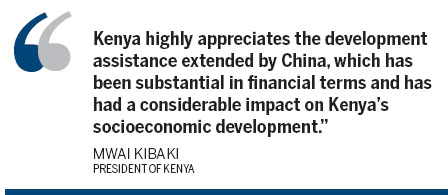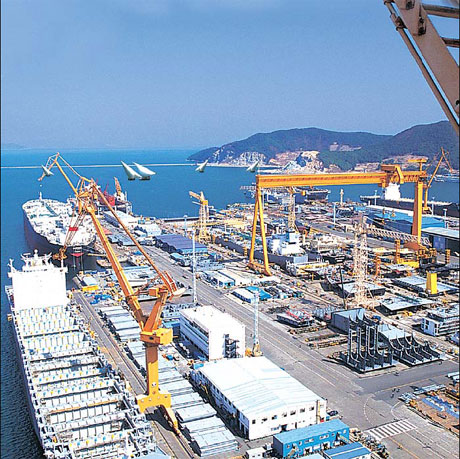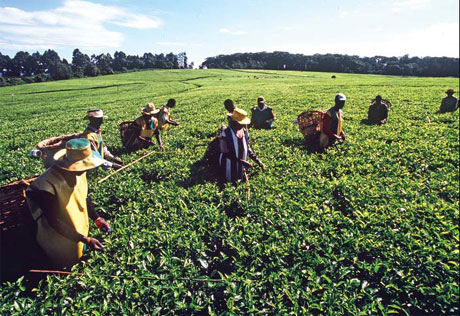News
Investment in agriculture to boost exports
(China Daily)
Updated: 2010-05-03 07:13
 |
Large Medium Small |
|
Port upgrades will greatly enhance trade between China and the East African Community market. |
|
A major road-building scheme aims to ensure that by 2030 no region of Kenya will be termed remote. |
|
Tea is one of the commodities that form the Kenya 'brand', along with coffee, flowers and produce. |
Transport and farming sectors offering vast opportunities
With under-developed infrastructure a real impediment to growth, transport features strongly in the government's Vision 2030 plan. As well as under-serving Kenyan farmers and other businesses needing to transport goods around the country, the lack of effective road, sea and rail links significantly hampers Kenya's trading potential with its African neighbors and the rest of the world, including China.
Having pledged that "by 2030, it will become impossible to refer to any region of our country as remote", the government is now driving a far-reaching transport plan, covering roads, railways, ports, and airports. China has played a pivotal role in funding infrastructure projects in Kenya, and in Africa as a whole.
As President Kibaki has said: "The transport sector, and in particular, the roads sub-sector, play a key role in facilitating the marketing of agricultural produce, and exploitation of resources and opportunities, as well as the development of industries and import-export trade. Roads are also critical in facilitating provision of social services in health and education."
With this in mind, a commitment to the upgrade of the Nairobi-Thika Highway (50.4 km) from four to eight lanes has been made at a cost of $360 million. The road serves as a gateway to Northern Kenya, and neighbors Ethiopia and Somalia, and forms a vital stretch of the trans-Africa highway.
The project is expected to contribute immensely to the economic and social development of Kenya and neighboring countries as well as improving mobility and transport linkages between the Nairobi Metropolitan Area and satellite towns located along the highway. Public private partnership options are being considered for the highway's maintenance and management, and the numerous toll stations that will generate important funds for the road's upkeep.
Corridor port upgrade

Also slated for a multi-billion dollar development is the port and transport corridor on the northern coast of Kenya at Lamu which could greatly enhance trade between China and the East African community. During his New Year address, President Kibaki thanked the Chinese government for its commitment to funding parts of the Northern Corridor, and its work will begin this year.
"Kenya highly appreciates the development assistance extended by China, which has been substantial in financial terms and has had a considerable impact on Kenya's socioeconomic development."
Two major projects are also planned for the railways. A new standard gauge line will be laid from Mombasa to Kampala (Uganda) and Kigali (Rwanda), at a cost of $8.5 billion shared between the three countries. With its ability to handle more weight and speed, the new line will be useful for moving goods and people between the three countries.
Secondly, commuter rail services for Nairobi and its environs are being improved in a bid to drastically reduce congestion on the capital's roads. An additional line will be built from Embakasi to the Jomo Kenyatta International Airport.
The existing locomotive-hauled trains are also going to be replaced with diesel electric multiple units (DEMU), which have higher passenger capacity, faster transit speeds, and lower emissions. When completed, Nairobi's new railway system will have the capacity to carry at least 90,000 passengers daily, compared to the current 19,000.
Airport upgrades are also under way around the country. Kisumu Airport, Kenya's third busiest airport, is being expanded to meet international standards. China Overseas Engineering Group Co Ltd is facilitating the project.
Chinese collaboration in all these projects is warmly welcomed by the Kenyan government, who are extremely appreciative of the skills and expertise the People's Republic can provide.
Prime Minister Raila Odinga, who visited China in October last year, said: "Whenever we undertake a major construction project, the young people who were employed in it acquire skills in various areas in which they got trained for that specific project.
"When the project ends, these former employees keep these skills and use them to support themselves and the rural economy. That is another reason why we are putting a lot of emphasis on infrastructure development as a way to spur our economy on."
Prime Minister Odinga promised that in five years' time, each part of the country will have had at least one major road built.
Innovative agriculture
With a tropical climate and terrain conducive to growing a range of important crops, like coffee, tea, and sugar, it is no surprise that agriculture is the mainstay of the Kenyan economy. Accounting for almost a quarter of the country's gross domestic product, the government intends to develop the sector significantly within the next 20 years.
Under Vision 2030, the agriculture sector is to be made more innovative, commercially oriented and modern. Investment opportunities will exist across the spectrum, in coffee, tea, flowers, meat, sugarcane development, value-addition in the setting up of small to medium scale industries in several agricultural commodities, and the sector's marketing infrastructure.
Incoming Agriculture Minister Sally Kosgei forecasts accelerated growth that will peak and then stabilize at about 10 percent in the medium term and she is keen for Chinese investors to make that a reality.
"To achieve the required transformation of the sector into a profitable economic activity, clear and achievable strategies have been proposed on how to seize emerging opportunities and also how to address the various challenges," she said.
"The results will be realized by focusing on growth areas, that will include raising the productivity and commercialization of the sector; development and management of key factors of production; development and delivery of sector support initiatives; and the establishment and roll-out of supportive organizational and implementation structures. Private sector participation will be vital."
Sugar factories for both increased sugar production and power generation are vitally needed. There are between 1,000 and 15,000 hectares of land suitable for development and the erection of sugar processing factories in the Homa Bay and Busia districts.
The value-addition program will involve the setting up of small to medium scale industries in several agricultural commodities including tea, coffee and fruits. The main projects will include decaffeinated tea, various branded teas, instant coffee and processed coffee, mango/citrus processing in Eastern, Coast and Nyanza and banana processing in Central, Eastern and Nyanza provinces.
Meanwhile, wholesale markets will be set up for fresh produce in Nairobi, Nakuru, and Mombasa.
There are more than five million smallholders engaged in various types of agriculture within the country, namely industrial crops, food crops, horticulture and livestock and fisheries.
Industrial crops contribute more than 55 percent of the agricultural exports. Industrial crops make up the largest segment of agriculture's contribution to GDP, at 17 percent.
Horticulture has recorded significant export-driven growth in recent years and is now the largest sub-sector. Around 90 percent of exports go to Europe, and exports have relied on a few key markets, but EU tariffs make the sector vulnerable. The sub-sector is now making proactive efforts to maintain existing markets while creating new ones, and increasing Kenya's bargaining power in global agricultural markets.
Overcoming challenges
Despite the central role agriculture plays in the Kenyan economy, the sector faces challenges in terms of productivity, land use, markets, and value addition.
Productivity is constrained by a number of factors, including high cost seeds and fertilizers, over dependence on rain-fed agriculture, a lack of markets and limited application of technology and innovation.
Under its Vision 2030 scheme, the government is launching investment initiatives in the areas of: fertilizer cost reduction, irrigation intensification and expansion, seed improvement, and livestock development.
Attention is also being given to strengthen producer organizations to enable them to discharge their mandates effectively. This will involve making producer organizations more accountable to farmers who fund them through levies on farm produce.
Incentives will also be given to those farmers investing in energy and water-efficient irrigation systems and technologies.
Agriculture has a crucial role to play in Kenya's future. It will ensure food security, job creation and income generation, foreign exchange earnings and linkages with other sectors. About 80 percent of the country's population derives their livelihoods from this sector and its related activities. It is, therefore, key in addressing poverty, and as such, a vital part of Kenya's new Vision.

(China Daily 05/03/2010 page20)










